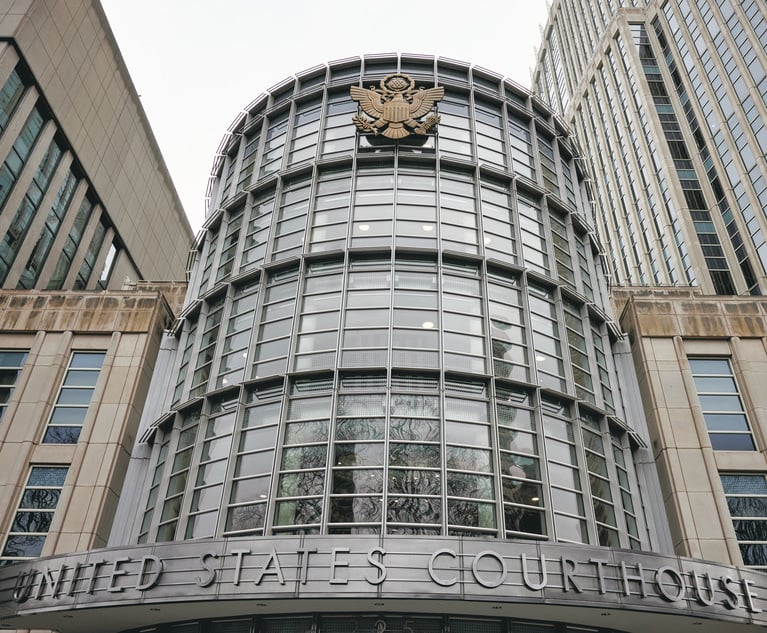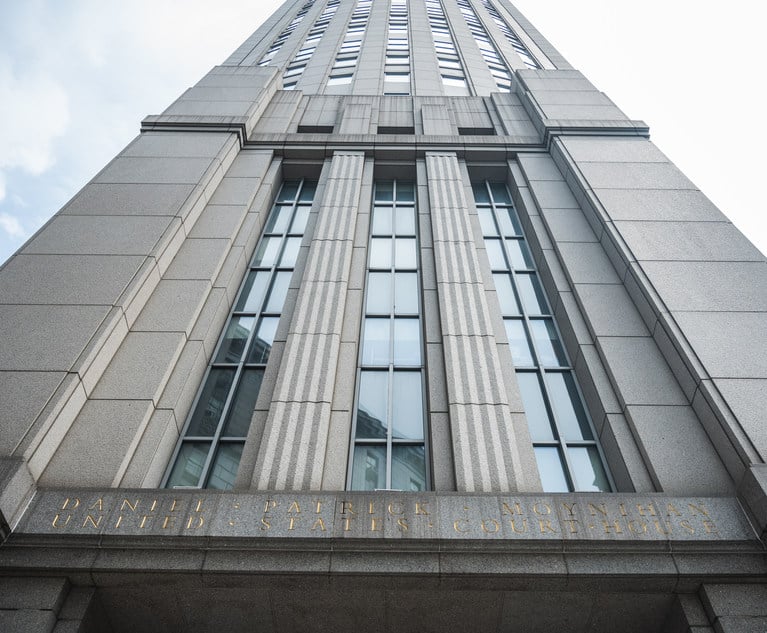Fried Frank Recruits Goldman Sachs Alum, Leading Stroock Litigator
With help from firm chairman David Greenwald, Fried Frank has recruited another Goldman Sachs veteran, hiring financial services litigator Michael Keats from Stroock & Stroock & Lavan.
May 21, 2018 at 05:20 PM
4 minute read
 Michael Keats. Courtesy photo.
Michael Keats. Courtesy photo.
With help from firm chairman David Greenwald, Fried, Frank, Harris, Shriver & Jacobson has recruited another Goldman Sachs alum, hiring financial services litigator Michael Keats.
Keats, 48, who joined Fried Frank late last week, was most recently co-head of the financial services litigation and enforcement practice at Stroock & Stroock & Lavan. Keats represents investment banks, private equity firms, hedge funds and payment processors in regulatory proceedings and civil litigation.
His clients have included Deutsche Bank, JPMorgan & Chase Co., hedge fund King Street and First Data Corp., as well as his former employer, Goldman Sachs.
While at Goldman Sachs from 2007 to 2012, during the heart of the financial crisis, Keats was managing director in the bank's litigation and regulatory proceedings group and an associate general counsel. There, he worked closely with Greenwald, who was international general counsel and a deputy general counsel at Goldman before joining Fried Frank in 2013 as co-chair. Greenwald then became the firm's top leader when co-chair Valerie Ford Jacob stepped down in 2014 and then left for Freshfields Bruckhaus Deringer.
“David and I have been chatting on and off for years about me coming over,” Keats said in an interview. “He helped rejuvenate the firm” and “I think he wants to help strengthen the litigation practice, already strong.”
The hiring comes just months after Fried Frank added another Goldman Sachs alum, corporate partner Darren Littlejohn, who was previously managing director and senior counsel in the bank's legal department. Littlejohn joined Fried Frank in January, arriving from Blake, Cassels & Graydon.
Keats' prior firm, Stroock, has recently undergone a strategy shift, emphasizing core areas, while establishing a nonequity partner tier and internal guidelines covering expectations for equity partners. Last year, the firm saw a string of corporate partner exits, but has hired partners in its financial restructuring and real estate practices.
Keats said Stroock's strategy shift, personnel changes and other developments didn't factor into his decision to leave the firm, and he was not part of the de-equitized partner group. Indeed, Stroock has been seeking to strengthen its financial services litigation department, he said.
Besides working with his former colleagues from Goldman, Keats said the practice advantage at Fried Frank was its strength in corporate practices, including private equity, asset management, mergers and acquisitions and capital markets.
“Historically, those are the practices I often work with from a litigation perspective,” he said, adding, they are an “important source of both business and expertise for someone” who focuses on financial services litigation.
While Stroock is well known for its real estate and financial restructuring practice, Fried Frank's private equity and M&A practice is further established, he said. “You look around. I saw the opportunities I had at Fried Frank and I didn't have to wait for somebody to build a corporate practice that was already there. It made it very attractive to me,” he said.
Keats added that he has had a long relationship with Fried Frank going back to 2007, having worked with the firm's litigators when he was at Goldman.
A Stroock spokeswoman did not immediately respond to a message seeking comment on Keats' exit.
In the last few weeks, Stroock also saw the exit of Marissa Holob, who joined Kramer Levin Naftalis & Frankel as a partner and co-chair of the firm's employee benefits department.
But earlier this month, Stroock touted its addition of Evan Hudson, co-chair of Duval & Stachenfeld's real estate capital markets group, as a corporate partner. The firm this year also added Michael Emanuel as a partner in its private funds group, arriving from asset management firm Eagle Investment Solutions, and restructuring partner Daniel Fliman, who joined from Kasowitz Benson Torres.
This content has been archived. It is available through our partners, LexisNexis® and Bloomberg Law.
To view this content, please continue to their sites.
Not a Lexis Subscriber?
Subscribe Now
Not a Bloomberg Law Subscriber?
Subscribe Now
NOT FOR REPRINT
© 2024 ALM Global, LLC, All Rights Reserved. Request academic re-use from www.copyright.com. All other uses, submit a request to [email protected]. For more information visit Asset & Logo Licensing.
You Might Like
View All
'No Evidence'?: Big Law Firms Defend Academic Publishers in EDNY Antitrust Case
3 minute read

Dapper Labs $4M Settlement, $1.3M in Attorney Fees Reveal NFT Settlement Trend
4 minute read
Syracuse Courtroom Dedicated to Trailblazing City Court Judge Langston McKinney
Trending Stories
- 1Infant Formula Judge Sanctions Kirkland's Jim Hurst: 'Overtly Crossed the Lines'
- 2Abbott, Mead Johnson Win Defense Verdict Over Preemie Infant Formula
- 3Guarantees Are Back, Whether Law Firms Want to Talk About Them or Not
- 4Trump Files $10B Suit Against CBS in Amarillo Federal Court
- 5Preparing Your Law Firm for 2025: Smart Ways to Embrace AI & Other Technologies
Who Got The Work
Michael G. Bongiorno, Andrew Scott Dulberg and Elizabeth E. Driscoll from Wilmer Cutler Pickering Hale and Dorr have stepped in to represent Symbotic Inc., an A.I.-enabled technology platform that focuses on increasing supply chain efficiency, and other defendants in a pending shareholder derivative lawsuit. The case, filed Oct. 2 in Massachusetts District Court by the Brown Law Firm on behalf of Stephen Austen, accuses certain officers and directors of misleading investors in regard to Symbotic's potential for margin growth by failing to disclose that the company was not equipped to timely deploy its systems or manage expenses through project delays. The case, assigned to U.S. District Judge Nathaniel M. Gorton, is 1:24-cv-12522, Austen v. Cohen et al.
Who Got The Work
Edmund Polubinski and Marie Killmond of Davis Polk & Wardwell have entered appearances for data platform software development company MongoDB and other defendants in a pending shareholder derivative lawsuit. The action, filed Oct. 7 in New York Southern District Court by the Brown Law Firm, accuses the company's directors and/or officers of falsely expressing confidence in the company’s restructuring of its sales incentive plan and downplaying the severity of decreases in its upfront commitments. The case is 1:24-cv-07594, Roy v. Ittycheria et al.
Who Got The Work
Amy O. Bruchs and Kurt F. Ellison of Michael Best & Friedrich have entered appearances for Epic Systems Corp. in a pending employment discrimination lawsuit. The suit was filed Sept. 7 in Wisconsin Western District Court by Levine Eisberner LLC and Siri & Glimstad on behalf of a project manager who claims that he was wrongfully terminated after applying for a religious exemption to the defendant's COVID-19 vaccine mandate. The case, assigned to U.S. Magistrate Judge Anita Marie Boor, is 3:24-cv-00630, Secker, Nathan v. Epic Systems Corporation.
Who Got The Work
David X. Sullivan, Thomas J. Finn and Gregory A. Hall from McCarter & English have entered appearances for Sunrun Installation Services in a pending civil rights lawsuit. The complaint was filed Sept. 4 in Connecticut District Court by attorney Robert M. Berke on behalf of former employee George Edward Steins, who was arrested and charged with employing an unregistered home improvement salesperson. The complaint alleges that had Sunrun informed the Connecticut Department of Consumer Protection that the plaintiff's employment had ended in 2017 and that he no longer held Sunrun's home improvement contractor license, he would not have been hit with charges, which were dismissed in May 2024. The case, assigned to U.S. District Judge Jeffrey A. Meyer, is 3:24-cv-01423, Steins v. Sunrun, Inc. et al.
Who Got The Work
Greenberg Traurig shareholder Joshua L. Raskin has entered an appearance for boohoo.com UK Ltd. in a pending patent infringement lawsuit. The suit, filed Sept. 3 in Texas Eastern District Court by Rozier Hardt McDonough on behalf of Alto Dynamics, asserts five patents related to an online shopping platform. The case, assigned to U.S. District Judge Rodney Gilstrap, is 2:24-cv-00719, Alto Dynamics, LLC v. boohoo.com UK Limited.
Featured Firms
Law Offices of Gary Martin Hays & Associates, P.C.
(470) 294-1674
Law Offices of Mark E. Salomone
(857) 444-6468
Smith & Hassler
(713) 739-1250






